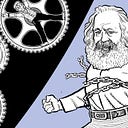Alienation and The Loss of Autonomy: Thoughts on Kafka’s “The Metamorphosis”
I just finished Kafka’s “The Metamorphosis.” What a fucking story. I’ve read a lot more Kafka in the past year or two, and I think he has become my favorite fiction writer of all time. He writes and understands themes I think about a lot: alienation, meaninglessness, and death.
Somehow though, I had never read “The Metamorphosis” despite it being his most famous short story. If you don’t know the premise, it’s fairly straightforward: one day the main character, Gregor Samsa, wakes up and finds that he has transformed into an insect. His parents and sister are terrified of him but continue to house and feed him. He loses his job. His family becomes broke because Gregor, who can no longer work because of his condition, is the sole breadwinner. In the end, Gregor starves himself to death because his family is suffering and hates him. His sister, in particular, spew vitriol at him.
A cursory glance at Wikipedia reveals that the story has many, many interpretations to it. But I’m going to ignore that all, and just free write my thoughts. My first instinct is that Gregor’s transformation is primarily about the alienation of the modern world. It is a theme Kafka continually refers to, including his most famous book The Trial. As Kafka was writing, modern intellectual thought was changing…
